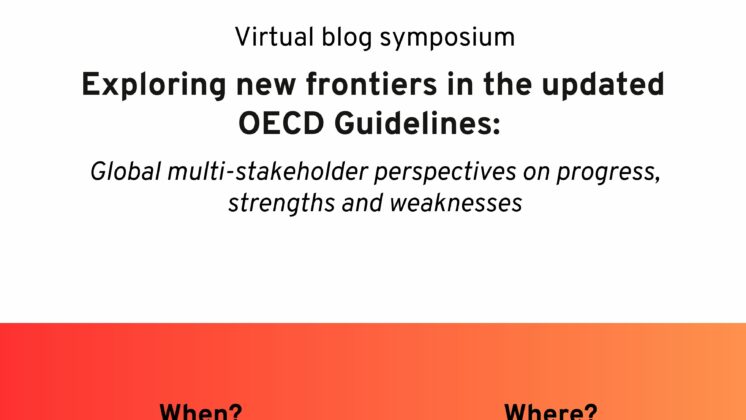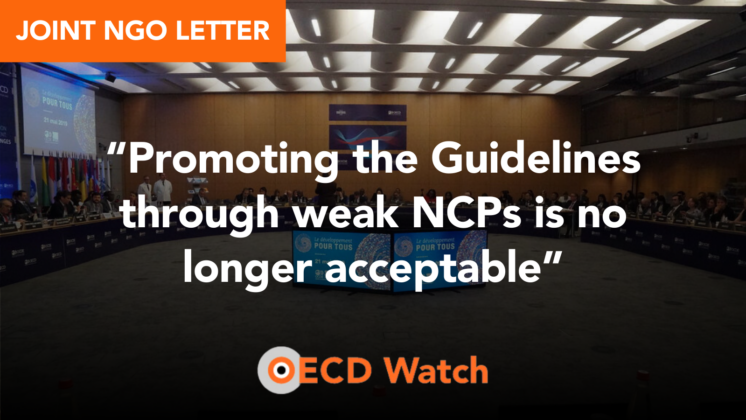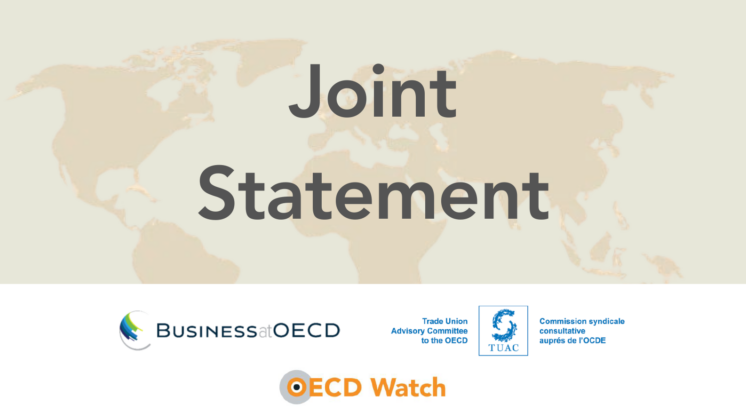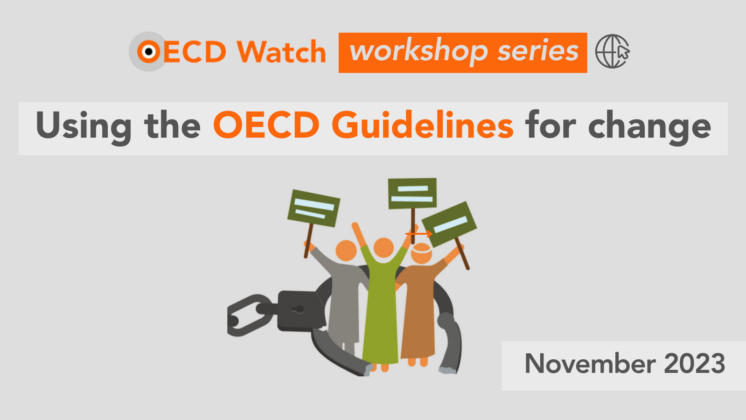By Blake Harwell
Blog symposium co-organised by OECD Watch and NOVA School of Law
Since the OECD Guidelines for Multinational Enterprises (“Guidelines”) were first recommended by the OECD in 1976, trade unions understood the employment and industrial relations standards to be consistent with ILO Conventions 87 and 98,[1] applying to all workers in an enterprise’s supply chain. As enterprises increased the use of subcontracting to fragment employment relationships in their supply chains, trade unions sought to clarify the language to ensure the Guidelines remain responsive to workers’ reality.

In the 2023 updated Guidelines, fifty-one governments approved deleting the 2011 text “employed by the multinational enterprise.” The 2023 Guidelines unambiguously enable all enterprises to promote positive industrial relations to all workers in a value chain no matter how fragmented or informal the work becomes. (Guidelines V.1a and V.1b)
If an enterprise is the employer, its obligations are to implement the updated employment chapter in its entirety. The enterprise must avoid actions or statements that interfere in workers’ right to form and join trade unions. Such an enterprise would be the counterparty in collective bargaining negotiations with workers’ chosen representative.
When an enterprise relies on work performed through a business relationship, an enterprise should apply the due diligence recommendations contained in Chapter II and use business contracts and investments to leverage observance of Chapter V in all their business relationships.
The updates are sure to generate questions for workers, businesses and governments. I can think of seven.
1. What was updated?
Enterprises should notice a clarification about respecting workers’ choice of representation. The Guidelines now state that enterprises should “avoid[…] interfering with workers’ choice to establish or join a trade union or representative organisation of their own choosing.” (V1a) Enterprise interference in workers’ representational decisions are a significant reason for the declines in collective bargaining in OECD countries.[2] Enterprises violate the Guidelines if they or businesses in their supply chain interfere with workers’ decision about representation. This update has the potential to restore workers’ confidence in building trade unions.
The provision for “highest possible wages and working conditions” (V.4) can now be applied to both developed and developing markets where an enterprise operates. This can facilitate higher wages and better conditions throughout an enterprise’s supply chain, at home and abroad.
Updated provisions on workplace health and safety (V.1f and V.4) mean an enterprise will be expected to provide (not just promote) the highest standards for safe and healthy workplaces throughout their operations.
And finally, meaningful due diligence obligations are specifically applied to the employment and industrial relations chapter. This is an important update that can cover even the most fragmented and informal working arrangements. The update aligns with previous OECD due diligence recommendations that prioritise trade unions for meaningful due diligence.
2. What kinds of actions or statements would “interfere with workers’ choice to establish or join a trade union”?
Several examples of enterprise conduct routinely observed by trade unions would interfere with workers’ choice, such as:
- Telling workers that they are a “team” or “family” and do not need representation or collective bargaining agreements.
- Disparaging the trade union seeking to represent workers for collective bargaining.
- Making any statement or taking any action that would lead a worker to think their work and income would change if they formed a trade union.
- Creating a perception that the OECD Guidelines do not apply to the enterprise, so workers would not gain anything seeking to implement them.
- Using judicial appeals to deny or delay workers’ choice of a representative.[3]
- Relocating or sudden conversions of work to digital technology after workers demonstrate their choice for a representative.
3. Does an enterprise need to respect workers’ rights to choose a representative for collective bargaining when it is not the employer?
Yes. Removing the condition of employment means the updated Guidelines expect all enterprises to promote collective bargaining in their value chains, even if the workers are employed by a subsidiary, subcontract, or other type of business. When the enterprise employs workers, it must collectively bargain with the workers’ chosen representative. When the enterprise is not the employer but is connected to another business that is the employer, it should use its leverage, such as a contract, capital or debt covenants, to require its business relationship to bargain with the workers’ chosen representative.
4. Can a parent company use a subsidiary operation to relieve the parent’s Guidelines obligations?
No. The updated Guidelines apply to all workers, especially those within a company group. According to Chapter I.4, “The Guidelines are addressed to all the entities within a multinational enterprise (parent companies and/or local entities. According to the actual distribution of responsibilities among them, the different entities are expected to co-operate and to assist one another to facilitate observance of the Guidelines.” Company groups need to take the same approach to the Guidelines, especially on employment and industrial relations issues.
5. Does the Employment and Industrial Relations Guidelines apply to work performed on a digital platform?
Yes. Digital platform enterprises need to respect workers’ right to choose a representative and collectively bargain with that representative, regardless of a workers’ employment status in any jurisdiction.
6. Can an enterprise “avoid interfering in workers’ choice to establish or join a trade union” if it hires a third party to communicate with workers’ about their choice?
No. Enterprises in some jurisdictions hire a third-party consultant to engage workers about the company’s preference to remain union free. Hiring a consultant (which may itself be a multinational enterprise subject to the Guidelines) to engage workers about their right to choose representation is always interfering in workers’ choice.
7. What types of contractual clauses would be considered effective implementation of Chapter V updates?
Applications for the 2023 Guidelines Employment and Industrial Relations Chapter are available.
Contract provisions for an enterprise
Enterprises can agree to provisions that demonstrates observance of the updated Guidelines into framework agreements with a national or global trade union, in agreements with works’ councils, or as a provision appearing in a collective bargaining agreement.
Contract provisions for businesses in the enterprise’s supply chain
Enterprises can introduce a requirement for subcontracted businesses to guarantee compliance with Chapter V.
Conditions for investment mandates and financial transactions
Investors and other financial service providers can secure commitments from investees and borrowers in the instruments used in their financial transactions. Investee enterprises can be asked to provide guarantees of Guidelines observance. For example, investees can be asked to guarantee strict adherence to Guidelines on employment and industrial relations to minimise the risk of a labour dispute disrupting the operations and maximise returns on investment. Similar examples are possible in lending and other financial transactions.
Conditions for government investment, trade, procurement and contracts
Governments are also able to secure commitments from enterprises when it forms business relationships through investments, trade agreements, and procurement activities. Governments can make the Guidelines part of eligibility criteria to protect the public interest. A government contracted Enterprise can provide evidence of a commitment to workers that it will not interfere in workers’ choice to establish or join a trade union. Before executing the contract, the Government contracting authority can require evidence of Guidelines observance, in which the enterprise demonstrates it has an agreement with the workers’ chosen trade union to provide the highest standards of safety and health, and wages benefits and conditions of work that are consistent with the Enterprise’s global operations and are at least adequate to satisfy the basic needs of workers and their families.
Conclusion
The updated Guidelines provide new support for workers’ rights to form unions and bargain collectively. If implemented in the supply chain by enterprises and reinforced by government and investor activities, the updated Guidelines offer a course correction leading to positive industrial relations.
Change is hard and takes time. The OECD National Contact Points will be asked to do more to educate enterprises on how to implement Chapter V and be more demanding of enterprises in contributing to remediation of Chapter V issues. Anything less and the Guidelines will continue to be good intentions without meaningful impact.
References
[1] C87 The Freedom of Association and Protection of the Right to Organise Convention, 1948. C98 Right to Organise and Collective Bargaining Convention, 1949 https://www.ilo.org/dyn/normlex/en/f?p=NORMLEXPUB:12100:0::NO::P12100_ILO_CODE:C087 https://www.ilo.org/dyn/normlex/en/f?p=NORMLEXPUB:12100:0::NO::P12100_ILO_CODE:C098.
[2] TUAC 2021 Briefing #1, Implementing the OECD Guidelines for Constructive Industrial Relations.
[3] See Turkish Metal Workers Union, Birlesik Metal IS and Systemair AB. Sweden NCP 2021-2022.

About the author
Blake Harwell is a policy advisor for the Trade Union Advisory Committee to the OECD (TUAC) where he manages the Guidelines updates and relations with National Contact Points. Prior to joining TUAC in 2019, Blake worked for the North American hospitality union, UNITE HERE, where the Guidelines were used as the basis for regional labour peace policies and card check and neutrality agreements with large-cap multinational enterprises.
About the blog symposium
2023 is a momentous year in the corporate accountability world. In June, not only did the OECD adopt key revisions to the newly renamed OECD Guidelines for Multinational Enterprises on Responsible Business Conduct, but the European Parliament also agreed on its position on the proposed directive on corporate sustainability due diligence. In recognition of these important events, NOVA BHRE and OECD Watch are co-hosting a blog symposium in October and November 2023 focused on the updated OECD Guidelines in the context of the current corporate accountability landscape.
The views and opinions expressed in this blog represent the views of the author and does not necessarily represent those of OECD Watch or NOVA School of Law.













